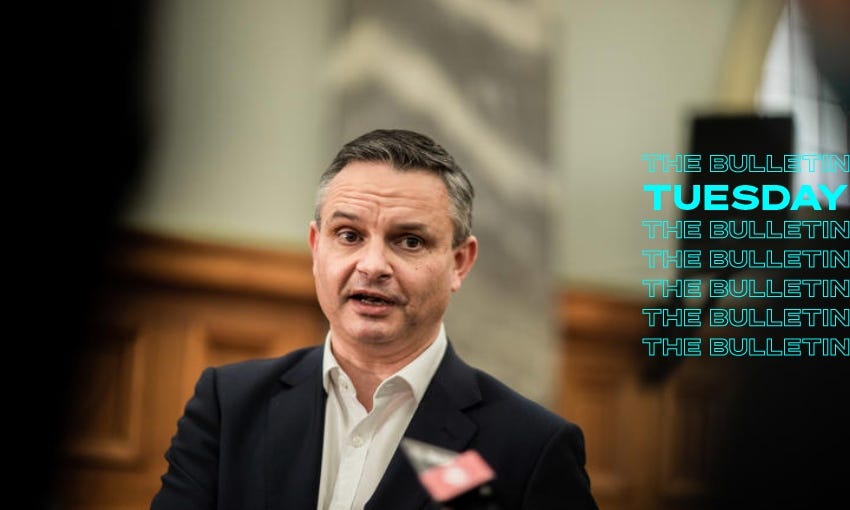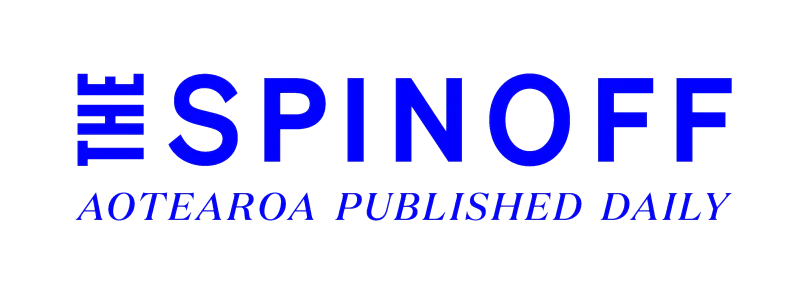Our first carbon budgets
Climate change minister James Shaw reveals country’s first three carbon budgets kicking off historic ten days for climate policy.
Mōrena and welcome to The Bulletin for Tuesday, May 10, by Anna Rawhiti-Connell. Presented in partnership with Z Energy.
In today’s edition: congestion charging likely for Auckland; new covid subvariant found at border; birds are back; but first, getting to carbon zero.
James Shaw has revealed country’s first carbon budgets (Photo: RNZ / Samuel Rillstone)
Emissions budgets released ahead of plan
Climate change minister James Shaw revealed the country’s first three carbon budgets yesterday. They span the periods between 2022–2025, 2026–2030 and 2031–2035. The budgets set a limit on the amount of greenhouse gas that can be emitted into the atmosphere. The budgets are based on meeting requirements in the Zero Carbon Act which was passed in 2019 and established the climate change commission. The full plan is out next Monday. RNZ’s climate reporter, Hamish Cardwell has a useful timeline of the path to this point.
National party supports carbon budgets
In a statement from Christopher Luxon, the National party has endorsed the budgets. “Climate change is a huge challenge. National is fully committed to emissions targets including net zero by 2050,” Luxon said. Te Pāti Māori has said the budgets aren’t ambitious enough while Act has said they don’t support them, maintaining their position that a cap within the Emissions Trading Scheme would be sufficient. Shaw has worked to obtain bipartisan consensus on the plan to ensure certainty as governments change. There will be a special parliamentary debate on the budgets on Thursday.
Error spotted by journalist changes budgets
In a mistake attributed to “genuine human error” in March, the ministry of primary industries supplied information to the government that claimed new forests could not be planted without significant deforestation. The government extended the 2022-2025 carbon budget to account for this, adjusting it to 292m tonnes, 2m tonnes more than was recommended by the climate change commission. The error was reported by Stuff journalist Olivia Wannan. Shaw resolved to investigate the issue and the carbon budgets are now back in line with the original recommendations made by the climate change commission.
Half price public transport fares may be here to stay
Finance minister Grant Robertson has already flagged that a significant new spend in the budget will go towards meeting our climate goals. Stuff’s Ben Strang reports that the idea of making the public transport fare discount permanent has been part of budget discussions. The government introduced the nation-wide three-month discount in response to rising fuel prices. Auckland Transport reported patronage figures yesterday. There were 1.22 million trips on public transport last week, the largest number since August 2021. More time may be required before we can see how much impact half-price fares have had as the lifting of covid restrictions will no doubt have played a part as well.
A message from our creative director, Toby Morris: Here at The Spinoff we’re proud to be a bit different. In the way we approach our journalism, in our tone, in the things we’re thinking about, all the way through to our design and our videos and our podcasts, we’d like to think we’re doing things and trying things in a way that no other New Zealand media organisations would. And it’s our beloved members that let us do that - both through their financial support, and the encouragement of their engagement: they’re readers who care like we care, who are also interested in seeing things done in a slightly different way. If you like what we’re doing and want to see more of it, have a think about joining up, and help The Spinoff be The Spinoff. Join today!
Congestion charging on the cards for Auckland
As reported by Thomas Coughlan at NZ Herald this morning, the government is likely to announce that congestion charging will be introduced for central city roads in Auckland. Todd Niall at Stuff has details of a report from the Helen Clark Foundation published this morning. The report says congestion charging could be fairly implemented in Auckland now but more work is required before it could be done in Wellington. Foundation fellow, Tom James said an initial cordon around Auckland’s city centre will meaningfully reduce traffic and emissions and be equitable.
Further boost to apprentice training scheme
As budget season dictates, we are writing and you are reading the words “pre-budget announcement” most days. At the post-cabinet press conference yesterday, Chris Hipkins and Carmel Sepuloni announced a $230m extension to the apprenticeship boost programme that was due to end in August. Tu Nu'uali'itia from the Māori and Pasifika Trades Training consortium spoke about getting more young people into trades in this episode of The Spinoff’s On Site podcast. Grant Robertson fronted the press conference as the PM continues to isolate.
Covid subvariant causing fifth wave in South Africa detected at border
Experts have put a new wave of covid cases in South Africa down to the BA.4 and BA.5 subvariants. Siouxsie Wiles has outlined what’s known about them. Stuff also has a good explainer. The Ministry of Health said the arrival of the BA.5 sub-variant in New Zealand was not unexpected. Michael Baker has said he expects cases to rise over winter and that new variants were one of several factors at play. He said new cases in Auckland have already increased by 12% a week over the last three weeks.
The birds are back in town
A new study shows that restoration of urban forests is returning native birds to our cities. The study tracked changes in native bird communities in 25 restored forests in Hamilton and New Plymouth. In some of the forests, there were as many species of native birds as could be found in untouched native forest remnants. Wellington city councillors are discussing a plan to double the number of trees in the central city on Thursday. Oneroa on Waiheke Island isn’t a dense urban area but I was there over the weekend, and spotted a Tūī in the tree outside my window. The study’s authors say “urban restoration of forests provides a renewed link between people and native environments”. I have ten terrible photos of my Tūī in the tree and I do feel somewhat closer to our native environment after the sighting.
Got some feedback about The Bulletin, or anything in the news? Get in touch with me at thebulletin@thespinoff.co.nz
Toby Manhire looks at what the Australian election's "teal wave" means for New Zealand politics; Jacob Flanagan takes a deep dive into Countdown's price freeze; Alex Casey meets the international Lego sorcerer serving as brickmaster on Lego Masters NZ; Catherine Woulfe is tempted until she reads the fine print of a too-good-to-be-true sounding job ad; Fiona Fraser explores the rise of "sugar dating".
Concern about data collection in sport
A lot of us have embraced “the quantified self”, using smart watches and apps to track our activity, heart rate and menstrual cycles. If you’re a professional sportsperson, data is being used to maximise your performance. Dr Stacy Sims has been working with the Black Ferns to do just that based on their individual menstrual cycles. However, an Australian discussion paper contains a warning about the amount of data being collected in professional sport. Auckland University’s Gehan Gunasekara agrees, saying people need to be aware of data storage security risks and that data collection had “seeped” into every aspect of the bodies and private lives of athletes in New Zealand and overseas.













